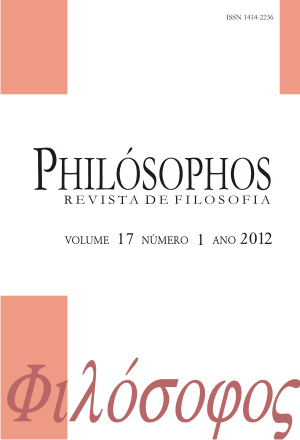NOTAS SOBRE A FILOSOFIA CONCRETA DO INÍCIO DO SÉCULO XX
DOI:
https://doi.org/10.5216/phi.v17i1.16894Palavras-chave:
Espírito, concreto, universal, particular.Resumo
Trata-se, para nós, de nos situar junto à filosofia de Merleau-Ponty para fazer surgir, em contraste com o comportamento teórico denominado por ele de “pequeno racionalismo” do início do século XX, a noção de concreto, a qual mistura em si mesma o fato e a essência, a particularidade e a universalidade. Inicialmente, lembraremos o modo como o filósofo comenta esta postura teórica que reduz tudo o que se pode dizer sobre o mundo àquilo que diz a ciência. Em seguida, insistiremos, mesmo que muito rapidamente, no fato de que tal posição teórica não está distante de uma posição política demasiadamente otimista que não se dá conta do mundo em que ela mesma se manifesta. Segundo Merleau-Ponty, para compreendermos as relações entre o sentido e o não-sentido é preciso formar uma nova ideia de razão: não uma razão que opera agenciando conceitos sobre um fundo de racionalidade inquestionável, mas uma razão que abarca suas origens. O esboço destas ideias servirá de pano de fundo para estas notas que giram em torno da noção de concreto na filosofia do início do século XX.Downloads
Downloads
Publicado
Como Citar
Edição
Seção
Licença
Autores que publicam nesta revista concordam com os seguintes termos:
- Autores mantêm os direitos autorais e concedem à revista o direito de primeira publicação, sendo o trabalho simultaneamente licenciado sob a Creative Commons Attribution License o que permite o compartilhamento do trabalho com reconhecimento da autoria do trabalho e publicação inicial nesta revista.
- Autores têm autorização para assumir contratos adicionais separadamente, para distribuição não-exclusiva da versão do trabalho publicada nesta revista (ex.: publicar em repositório institucional ou como capítulo de livro), com reconhecimento de autoria e publicação inicial nesta revista.















